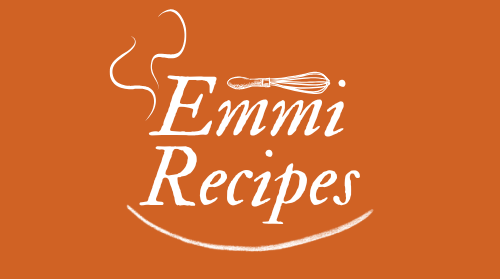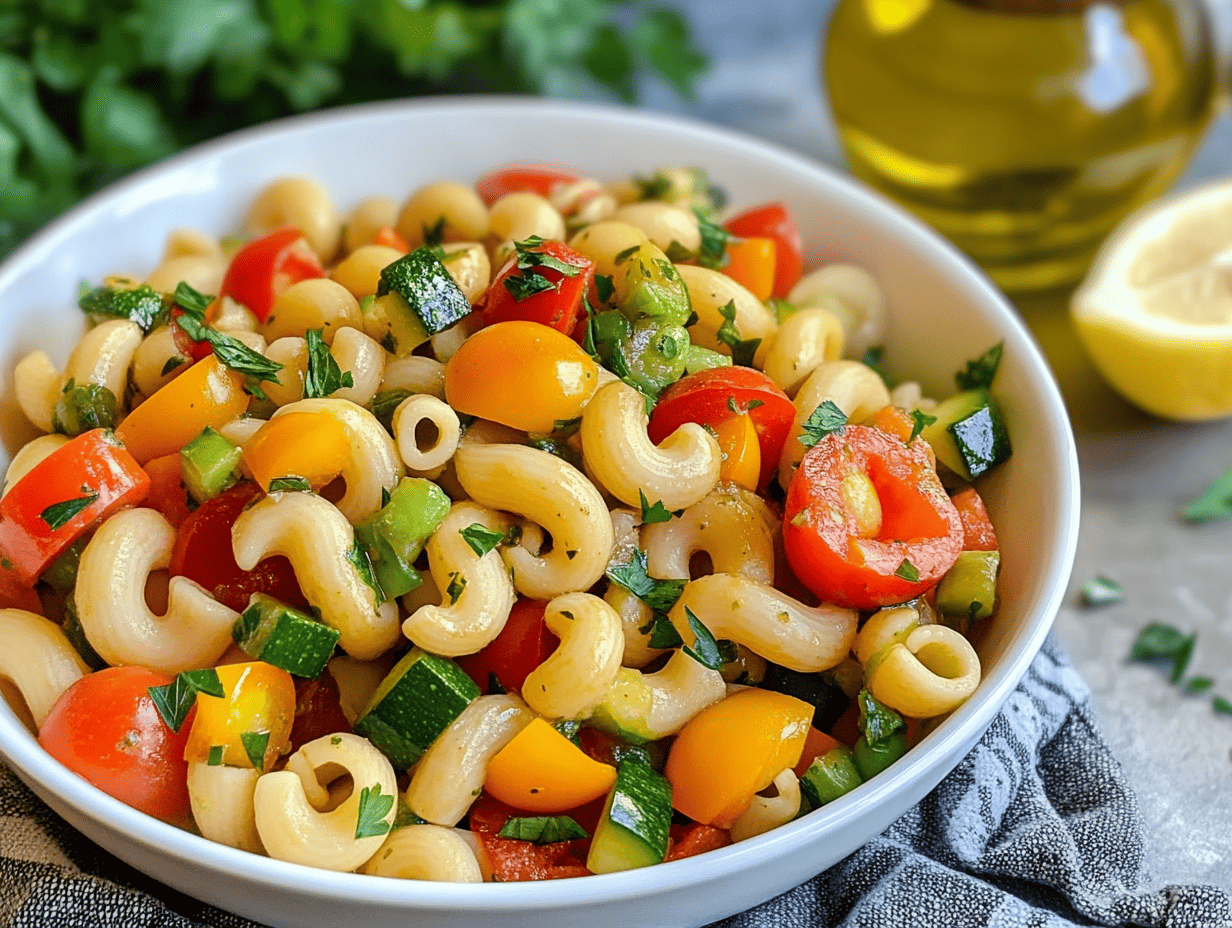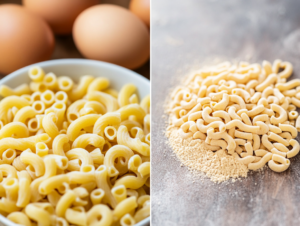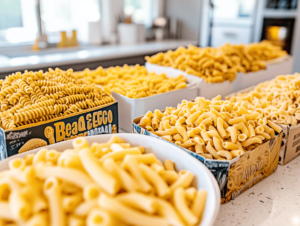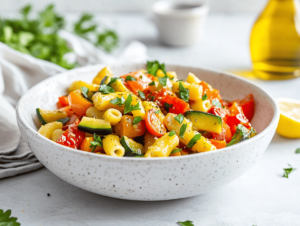Introduction
Is Macaroni Pasta Vegan?
Macaroni pasta has long been a comfort food for people around the globe, featured in dishes like macaroni and cheese or pasta salads. But for those committed to a vegan lifestyle, the question arises: Is macaroni pasta vegan? This guide will take you through everything you need to know, from understanding the ingredients of macaroni pasta to identifying vegan-friendly options and substitutes. Let’s dig in and uncover the truth!
Understanding Macaroni Pasta
What is macaroni pasta?
Macaroni pasta is a type of dry pasta, recognized for its short, hollow, curved shape that resembles small elbows. Traditionally made from durum wheat semolina and water, macaroni is a staple in many households due to its versatility and firm texture. Its sturdy shape holds up well in creamy sauces, soups, and even baked dishes.
Common uses and types (e.g., elbow, shells):
Macaroni is most famously used in macaroni and cheese, but its uses extend far beyond this iconic dish. You’ll often find it in pasta bakes, soups like minestrone, and even pasta salads. Variations in shape include elbows, shells, and other small tubular forms, each with unique characteristics that cater to different recipes and textures.
What Does “Vegan” Mean in Food?
Definition of veganism:
At its core, veganism involves avoiding all animal-derived products in food and lifestyle choices. For food products, this means excluding ingredients like meat, dairy, eggs, honey, or any animal by-products. Veganism isn’t just about nutrition—it’s a lifestyle aimed at reducing harm to animals and the environment.
Key considerations for packaged food products:
Packaged foods, including macaroni pasta, often require careful scrutiny. While many dried pasta products contain only wheat and water, others may sneak in non-vegan ingredients like egg or dairy. Labels with certifications such as “100% vegan” or those from trusted organizations like the Vegan Society can be helpful in identifying suitable products. Always look closely at ingredient lists, as some additives and preservatives may not align with vegan standards.
In the following sections, we’ll explore the ingredients, variations, and ways to identify vegan-friendly macaroni pasta while offering tips to make informed choices.
Ingredients in Macaroni Pasta
Traditional Ingredients in Macaroni Pasta
When you pick up a package of macaroni, the most common ingredients you’ll find listed are durum wheat semolina and water. These two ingredients are the backbone of most macaroni pasta, providing its signature texture and structure. Durum wheat semolina is a high-protein, hard wheat flour that gives pasta its firm, chewy bite, while water simply helps bind everything together.
However, not all macaroni pasta is created equal. While these two ingredients are sufficient to create a vegan macaroni, many brands may use additional ingredients. One of the most notable is eggs, often included in pasta recipes for texture and a richer color. It’s where things get tricky for vegans: egg-based pasta is clearly off-limits, as it contradicts the principles of a plant-based diet. This is why, as a vegan, it’s crucial to understand what’s in your pasta before purchasing.
Are All Store-Bought Macaroni Vegan?
Common ingredients used by popular brands:
For those who frequently purchase macaroni pasta, the good news is that most store-bought varieties are, indeed, vegan-friendly. You’ll find that many brands make their pasta with only durum wheat semolina and water. This is especially true for dried pasta products, which are more commonly free from animal-derived ingredients. However, as with any packaged food, you still need to check the label.
Some brands may include eggs or dairy, especially in fresh pasta varieties. It’s not just limited to traditional macaroni; you may see it in other pasta shapes too. Also, keep an eye out for ingredients like whey (a dairy by-product) or casein (a protein found in milk), which may sneak their way into certain products.
Labeling practices to identify vegan-friendly options:
The best way to ensure your macaroni is vegan is to look for vegan certification labels. Many brands now offer products with clear vegan logos or claims such as “egg-free” or “dairy-free” on the packaging. These labels make it easier to spot pasta that aligns with a plant-based lifestyle. Moreover, check the ingredients list—if the pasta contains anything like eggs or milk, it’s definitely not vegan.
Fresh vs. Dried Macaroni: Key Differences
Fresh pasta’s reliance on eggs:
It is often sold in the refrigerated section of your grocery store, is where the egg dilemma arises. Eggs are frequently used in fresh pasta recipes to add richness and improve the texture, making it softer and more pliable. These eggs, however, make fresh pasta unsuitable for vegans. If you love fresh pasta, it’s essential to look for vegan alternatives, which are becoming more available in the market.
Why dried pasta is often vegan:
On the flip side, dried macaroni pasta is typically vegan-friendly, as it’s usually made with just semolina flour and water. The drying process helps preserve the pasta, giving it a shelf life of months or even years, and since the pasta is typically harder and more durable, there’s less need for eggs to aid in texture. Of course, some brands may still include eggs in their dried pasta, so be sure to double-check the packaging.
With that in mind, it’s easy to see why dried macaroni pasta is often a safer choice for vegans, provided the label doesn’t include animal-derived ingredients.
Gluten-Free and Alternative Macaroni Options
For those following a gluten-free diet or seeking alternative pasta options, there’s good news: vegan-friendly macaroni is available in a variety of forms that go beyond traditional wheat-based pasta. Gluten-free macaroni options are made from ingredients like rice, chickpeas, and quinoa, offering similar textures while adhering to vegan guidelines.
Rice, chickpea, and quinoa-based pasta options:
- Rice-based pasta is one of the most common alternatives, and it’s typically free from eggs or dairy. It offers a slightly different texture but can work well in many pasta dishes.
- Chickpea pasta, made from chickpea flour, is another popular option. Not only is it gluten-free, but it’s also high in protein and fiber, making it a nutritious option for vegans.
- Quinoa pasta blends quinoa flour with other gluten-free grains like corn or rice to create a light, delicate pasta with a mild flavor.
These alternatives are an excellent choice for anyone who is vegan and needs to avoid gluten. However, it’s crucial to check labels—some may contain non-vegan ingredients like egg whites or dairy-based flavorings.
The importance of vegan certifications:
As the demand for plant-based and gluten-free products rises, many brands are responding by offering certified vegan pasta options. Always look for the vegan certification symbol on packaging to ensure that your gluten-free pasta is free from animal by-products. For example, the Vegan Society certification ensures that no animal-derived ingredients or testing were involved in the production. When in doubt, a quick glance at the ingredient list can confirm whether the pasta meets your dietary needs.
Choosing gluten-free and alternative macaroni options can make meal preparation easier and more enjoyable, all while sticking to your vegan principles. Keep an eye on ingredient labels to ensure that what you’re purchasing is in line with your dietary goals.
Hidden Non-Vegan Ingredients
Animal-Derived Ingredients to Watch For
When shopping for macaroni pasta, even if the packaging looks promising, hidden animal-derived ingredients might still lurk inside. These ingredients aren’t always obvious, so knowing what to look for can help you stick to your vegan diet without surprises. Let’s go over a few commonly used animal-based ingredients that can sometimes show up in pasta.
Ingredients such as egg powder, whey, and casein:
- Egg powder is often used to enhance texture and color in pasta, making it smoother and giving it a more appealing golden hue. As the name suggests, it’s made from eggs, and obviously, eggs are not vegan-friendly.
- Whey, a by-product of cheese-making, is sometimes added for its protein content or to improve the texture of pasta. This ingredient often sneaks its way into processed foods, including pasta.
- Casein is another dairy-derived ingredient that might be found in pasta, especially in some fresh varieties. Casein is a protein found in milk, and it can sometimes appear in processed foods under various names.
These ingredients may not always appear under familiar terms like “milk” or “egg,” so you must stay vigilant and look out for them.
Understanding ambiguous additives like mono- and diglycerides:
Manufacturers often use additives like mono- and diglycerides as emulsifiers in processed food to blend ingredients that would typically separate, such as oil and water. While these additives can come from plant sources, many commercial pasta brands derive them from animal fats. Since these additives are usually labeled simply as “mono- and diglycerides,” it’s not always easy to determine their origin.
Reading Food Labels Like a Pro
When it comes to maintaining a vegan lifestyle, being able to decode food labels is essential. It’s easy to glance at the packaging and assume the pasta is vegan, but ingredient lists often tell a different story. Let’s walk through the essentials of reading food labels so you can identify non-vegan ingredients with confidence.
Decoding Ingredient Lists
When shopping for vegan pasta, always start by reading the ingredient list carefully. Read the ingredient list in order of quantity, and look for non-vegan ingredients near the top, such as egg powder, casein, or whey. Even if these ingredients appear lower down, they can still be problematic, especially if they’re present in trace amounts.
Be aware of E numbers (food additives) like E471 (mono- and diglycerides), which can come from both plant and animal sources. If unsure, don’t hesitate to contact the manufacturer for clarification.
Recognizing Vegan Certification Logos
To simplify label-checking, look for well-known vegan certification logos, such as the Vegan Society logo. This ensures the product is free from animal ingredients and cruelty-free.
Some products also state that they are “egg-free,” “dairy-free,” or “100% plant-based.” These labels can be a helpful indication, but always double-check the ingredient list to ensure full transparency.
By following these steps, you can easily identify vegan-friendly macaroni pasta and avoid any hidden animal-derived ingredients. Always read the labels closely and trust reputable certifications to maintain your plant-based lifestyle.
Vegan Macaroni Pasta Options
Top Vegan Macaroni Brands to Consider
Finding the right vegan macaroni pasta has never been easier, thanks to the growing demand for plant-based products. Several brands have recognized the need for vegan-friendly pasta options, and they’ve made it easy for you to enjoy macaroni without compromising your dietary preferences. Let’s take a look at some widely available brands that are perfect for your vegan meals.
Examples of widely available vegan macaroni pasta brands:
- Barilla: Offers vegan-friendly dried pasta, including classic elbow macaroni, made from durum wheat semolina and water. They also provide gluten-free options.
- De Cecco: Known for high-quality pasta, De Cecco’s elbow macaroni is egg- and dairy-free, ensuring it’s 100% vegan.
- Annie’s Homegrown: Offers organic, vegan elbow macaroni, perfect for eco-conscious pasta lovers.
- Banza: Made from chickpeas, Banza’s macaroni is vegan, high in protein and fiber, and holds up well in various dishes.
- Tolerant Foods: Features vegan pasta made from lentils and other legumes, including macaroni made from red lentils, packed with protein.
These brands are just a few examples of the many vegan macaroni pasta options available on the market today. When selecting a brand, always check the ingredient list to ensure there are no animal-derived products like egg powder or dairy. With so many excellent choices, there’s no reason to miss out on your favorite pasta dishes.
Making Your Own Vegan Macaroni Pasta
If you’re the type who loves to experiment in the kitchen, why not try making your own vegan macaroni pasta? Homemade pasta not only allows you to control the ingredients but also adds a special touch to your meals. Plus, making pasta from scratch is simpler than you might think.
Homemade pasta recipes with plant-based ingredients:
Making your own macaroni pasta at home is easier than it seems, and it doesn’t require any fancy equipment. Here’s a simple recipe for vegan macaroni pasta:
- Ingredients:
- 2 cups semolina flour
- 1 cup all-purpose flour (or chickpea flour for a gluten-free option)
- 1/2 cup water
- 1 tablespoon olive oil
- A pinch of salt
- Instructions:
- In a large bowl, combine the semolina flour, all-purpose flour, and salt.
- Gradually add water and olive oil, mixing with your hands until the dough begins to come together.
- Knead the dough on a floured surface for about 5–10 minutes until it’s smooth and elastic.
- Cover the dough with a towel and let it rest for 30 minutes.
- Once rested, roll out the dough thinly and cut it into small elbow-shaped pieces (or any shape you like).
- Boil the pasta in salted water for about 2–3 minutes or until al dente.
Making pasta from scratch allows you to get creative, and if you’re avoiding gluten or have dietary restrictions, you can easily swap out the flour to suit your needs. It’s a fun and rewarding process that also guarantees a fresh, vegan product.
Tips for vegan substitutes (e.g., aquafaba for eggs):
When making homemade pasta, you might come across recipes that call for eggs to help bind the dough. But don’t worry—aquafaba (the liquid from canned chickpeas) works beautifully as an egg substitute in pasta recipes. Just replace the egg with 3 tablespoons of aquafaba for every egg the recipe calls for. Aquafaba not only binds the dough but also adds moisture without affecting the texture.
You can also experiment with other vegan substitutes like olive oil, vegan butter, or even flaxseed meal to achieve the right consistency and texture. Vegan pasta-making is all about creativity, so feel free to adjust based on your personal preferences.
Making your own vegan macaroni pasta guarantees a 100% plant-based meal and makes for an enjoyable activity as well. Whether you want to customize the flavor, texture, or ingredients, homemade pasta offers endless possibilities.
FAQs About “Is Macaroni Pasta Vegan?”
Is most dried pasta vegan?
Yes, most dried pasta is vegan, typically made from durum wheat semolina and water. However, always check for hidden ingredients like egg powder or dairy in the label.
How can I be sure my macaroni is vegan?
Check the ingredient list for any animal-derived ingredients such as eggs, whey, or casein. Look for vegan certifications or labels like “egg-free” or “dairy-free” to be sure.
What are the best vegan pasta brands?
Top vegan brands include Barilla, De Cecco, Banza, and Tolerant Foods. All offer egg-free, dairy-free macaroni options.
Can gluten-free pasta contain non-vegan ingredients?
Yes, some gluten-free pasta may contain eggs for texture. Always read the label to ensure it’s vegan.
Is macaroni and cheese vegan?
Traditional macaroni and cheese isn’t vegan, but you can make vegan versions using plant-based cheeses and dairy-free ingredients.
What are good substitutes for non-vegan pasta?
Try chickpea pasta, lentil pasta, or even zucchini noodles for a vegan alternative that’s high in protein and fiber.
Conclusion: Is Macaroni Pasta Vegan?
In conclusion, figuring out if macaroni pasta is vegan mostly depends on the ingredients. While many dried pasta options are naturally vegan, it’s important to check labels carefully for any hidden animal-based ingredients like eggs, whey, or casein. Look for vegan-friendly labels like “egg-free” or “dairy-free” to be sure.
Many well-known brands, like Barilla, De Cecco, and Banza, offer reliable, plant-based macaroni. You can also try making your own vegan pasta at home with simple ingredients like semolina flour and water, or explore gluten-free and legume-based pasta options for variety and extra nutrition.
By following these easy tips and being careful with ingredient lists, you can easily find vegan macaroni that fits your plant-based diet. Whether you stick with classic vegan macaroni or try something new, you’ll always have plenty of options to enjoy your favorite dishes!
